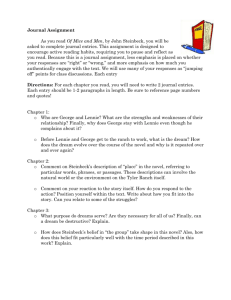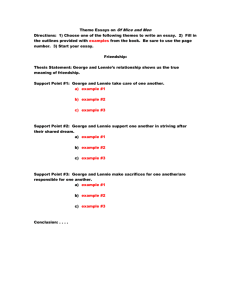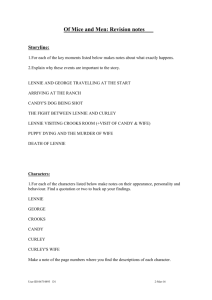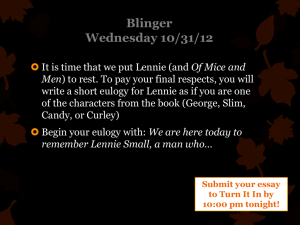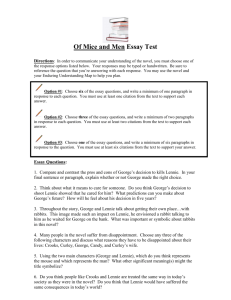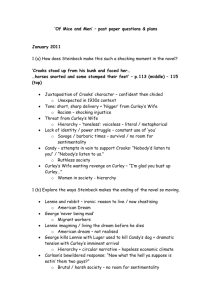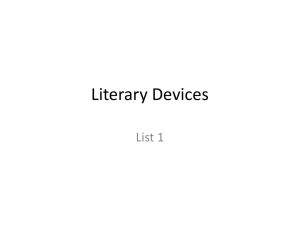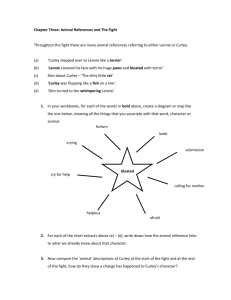Of Mice and Men
advertisement
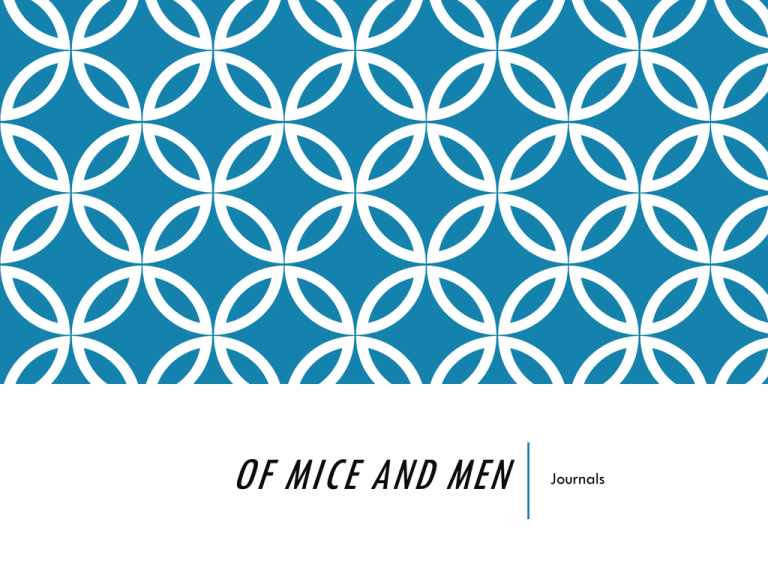
OF MICE AND MEN Journals JOURNAL 1: WHAT IS THE AMERICAN DREAM? Define it--what does it mean to people in general? What is Lennie and George’s American Dream? What is your American Dream? Describe it in detail. Why? What are some of your goals? How will you achieve this dream? What does what you own say about you? (Use the sheet we filled out last week to help you.) JOURNAL 2: POWER VS. POWERLESSNESS Who is powerful in the novel? Why? Who is powerless? Explain using quotes, events, and page numbers from the book. In what ways are you powerful? Powerless? Give an example. JOURNAL 3: SEXISM AND RACISM How are other characters sexist towards Curley’s wife? How are other characters racist towards Crooks? Name one other character who experiences discrimination in the novel. Use page numbers and textual evidence to explain. Describe a time you have experienced discrimination. How did it make you feel? How did you react? What did you learn? JOURNAL 4: LONELINESS Name at least 2 characters who are lonely in this novel. Why are they lonely? Explain using textual evidence and page numbers. In what ways are people lonely today? How are you lonely (or not)? Why? JOURNAL 5: COMMUNITY VS. THE INDIVIDUAL Which is more important? Why do you think this? Explain. Which do you think Steinbeck thinks is more important? Explain using textual evidence and page numbers. Choose a side, but also address the opposing side. INTELLIGENCE According the American Heritage Dictionary definition it means: The capacity to acquire knowledge; the faculty of thought and reason IQ: Intelligence Quotient- The ratio of tested mental age, usually expressed as a quotient multiplied by 100.5. LINGUISTICS: The study or science of meaning in language forms. LOGIC: The study of relationships between sign and symbols and what they represent. GARDNER’S MULTIPLE INTELLIGENCES Linguistic- such as used in reading a book or poem Logical- mathematical, such as used to solve mathematical problems Spatial- such as used in fitting suitcases into a trunk of a car Musical- as used in singing a song or composing a symphony Bodily-kinesthetic- as used in dancing or playing football Interpersonal- such as used in understanding the interactions with other people Intrapersonal- such as used in understanding one’s self Naturalist- such as understanding patterns in nature Spiritual- such as achieving a spiritual understanding of life and aspects of the universe Existential- as used in understanding the nature to some extent means of existence and existential issues. HOWARD GARDNER There are numerous theories about intelligence that have impacted our understanding of human ability. Howard Gardner is one of America’s leading theorists about intelligence. He has spent time in China and studied the style of education that is used. The Chinese style stresses copying the mentor. The family is the model in America and is used primarily to teach children how to get along. Americans see education as a necessary means for employment so we can survive. JOURNAL 6: INTELLIGENCE Define it in your own words. How are characters in the novel intelligent? Name at least 2 and explain using textual evidence. How are you intelligent? Use one or more of Gardner’s Multiple Intelligences to support your argument. THEMES AND MOTIFS 1. Human existence and competition 2. Trying to obtain one’s American Dream 3. Loneliness and Companionship 4. Friendship 5. Strength vs. Weakness 6. Discrimination/Prejudice 7. Freedom vs. Confinement 8. Innocence vs. Corruption EXAMPLES OF THEMES FROM THE NOVEL 1. Candy trying to talk Carlson out of shooting his dog (45) 2. George telling Lennie about future plans (13-15). 3. G &L’s relationship, Curley’s wife, Candy and his dog, Lennie and animals (9) 4. G & L (40), men on the ranch, Candy and his dog 5. Candy and dog, G & L, $ vs. workers, Curley’s dad 6. Lennie, Crooks (29), Curley’s wife (31) 7. Future plans, Curley’s wife (their marriage), job as a migrant worker 8. Lennie vs. red dress (41), dog vs. Carlson JOURNAL 7 Friendship Which characters are friends and/or display friendship qualities in the novel? Explain using textual evidence. What do you expect in a “good” friend? How are you a “good” friend? What actions/qualities create a “bad” friend? Explain your stance on George’s final act of “friendship” in the novel. Did he have the right to make the decision to do that to Lennie?
